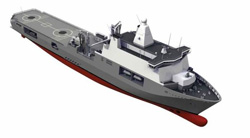 EU shipbuilders are active in the global market with increasing concentration in high value segments such as cruise ships:
EU shipbuilders are active in the global market with increasing concentration in high value segments such as cruise ships:
[list_icon color=green type=icon_chartcicle]
- EU shipbuilding exports in 2009: €11.9 billion
- EU shipbuilding imports in 2009: €14.7 billion
[/list_icon]
[line]
The shipbuilding industry is an important and strategic industry in a number of EU member states and for the EU as a whole. There are more than 300 shipyards in the EU and around 40 of these are active in the global market for large sea-going vessels. European shipyards employ around 140 000 people directly and more than 400 000 indirectly.
The production in the EU concentrates increasingly in high value segments. The European shipbuilding industry is the global leader in the production of cruise ships and several other form of high-tech or specialist vessels, such as fast ferries and dredgers.
Almost 80% of the world’s shipbuilding industry is located in Japan, Korea, China and the EU. Construction activity has increased in all major countries since 2000, but the but the number of new orders took a sharp decline in the third quarter of 2008, and continue to remain exceptionally low. The sector is strongly cyclical and directly affected by economic or financial fluctuations. It is also defined by a relatively high level of inflexibility in shipbuilding capacity.
The heavy investment costs associated with shipbuilding and its role as an industrial flagship industry in China, Korea and Japan have made the shipbuilding sector an attractive target for government subsidy. Japan used shipbuilding in the 1950s and 1960s to rebuild its industrial structure; Korea made shipbuilding a strategic industry for its economic development in the 1970s. China’s shipbuilding sector has enjoyed strong government support since the take-off of its industry at the end of the 1990s. Since 1994, the main shipbuilding nations have been trying to reach an agreement in the framework of the OECD on conditions for fair competition in the shipbuilding sector. Unfortunately, these negotiations have met with little success.
